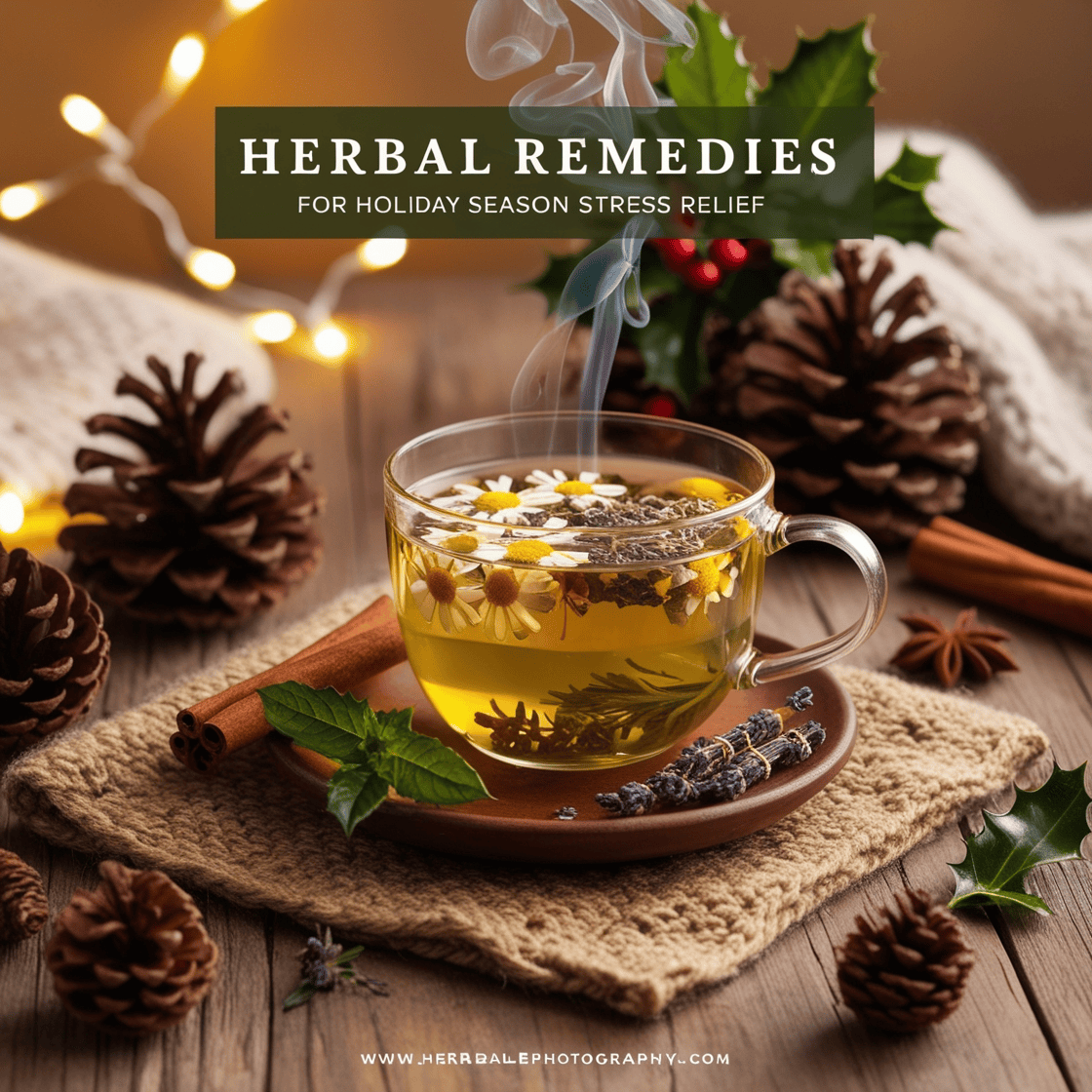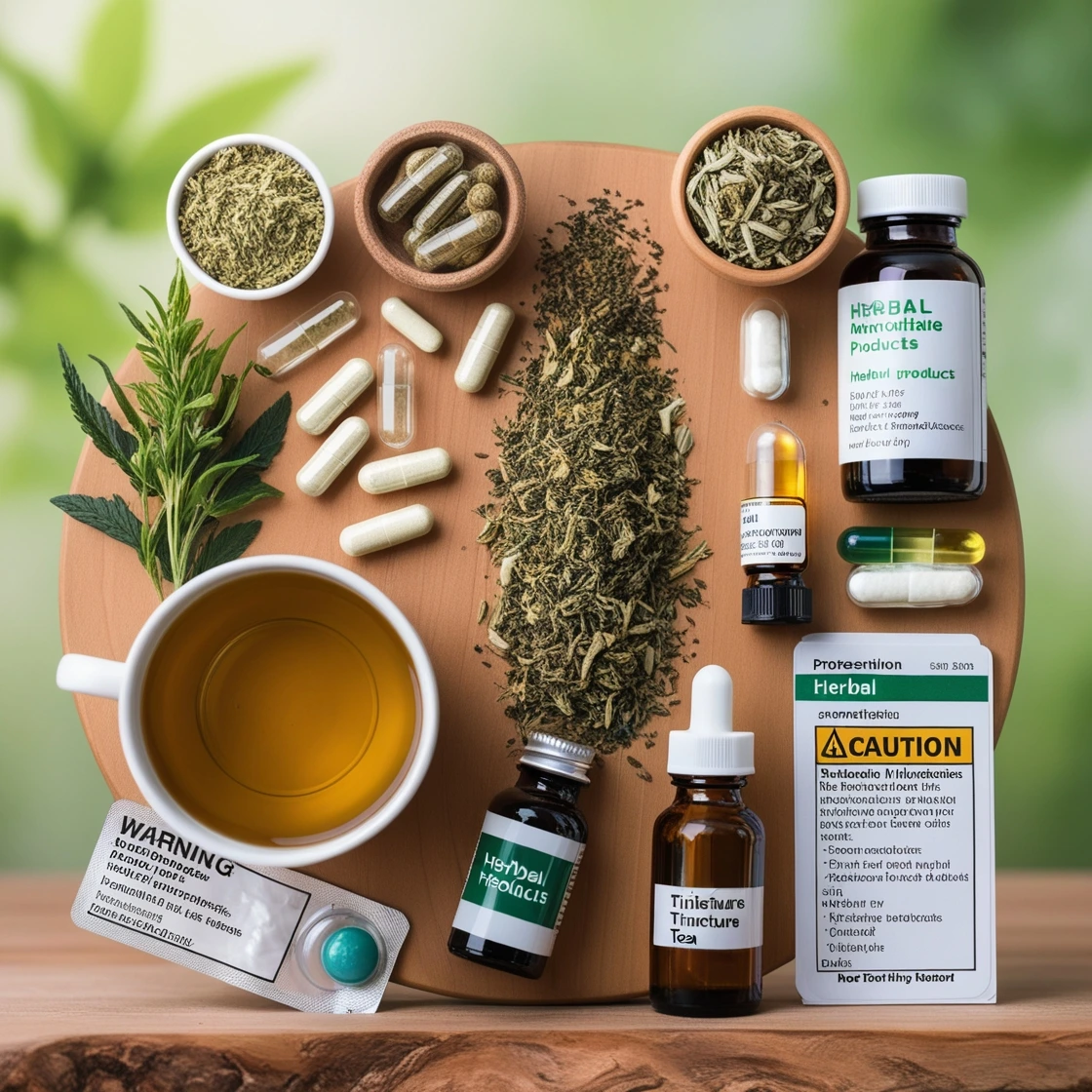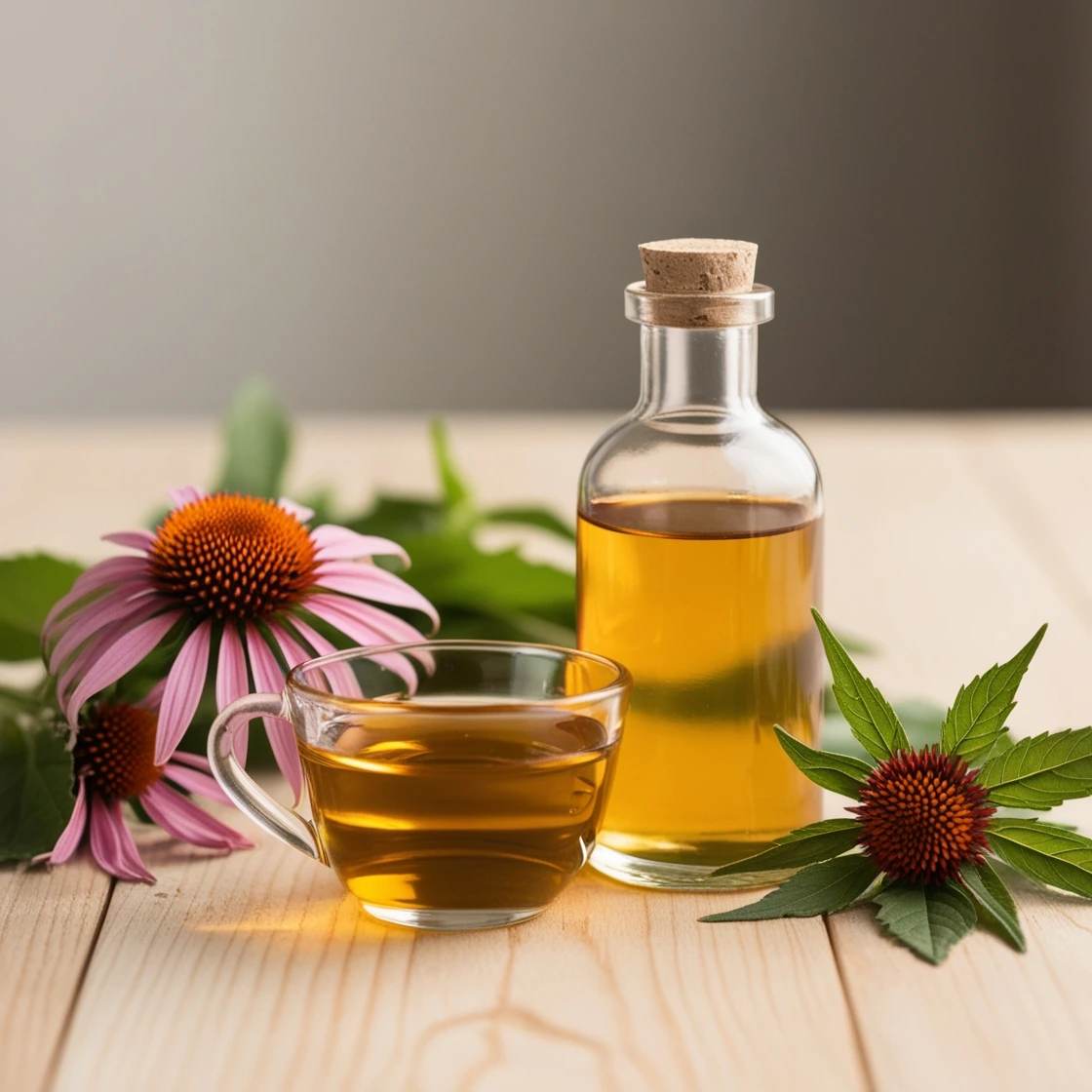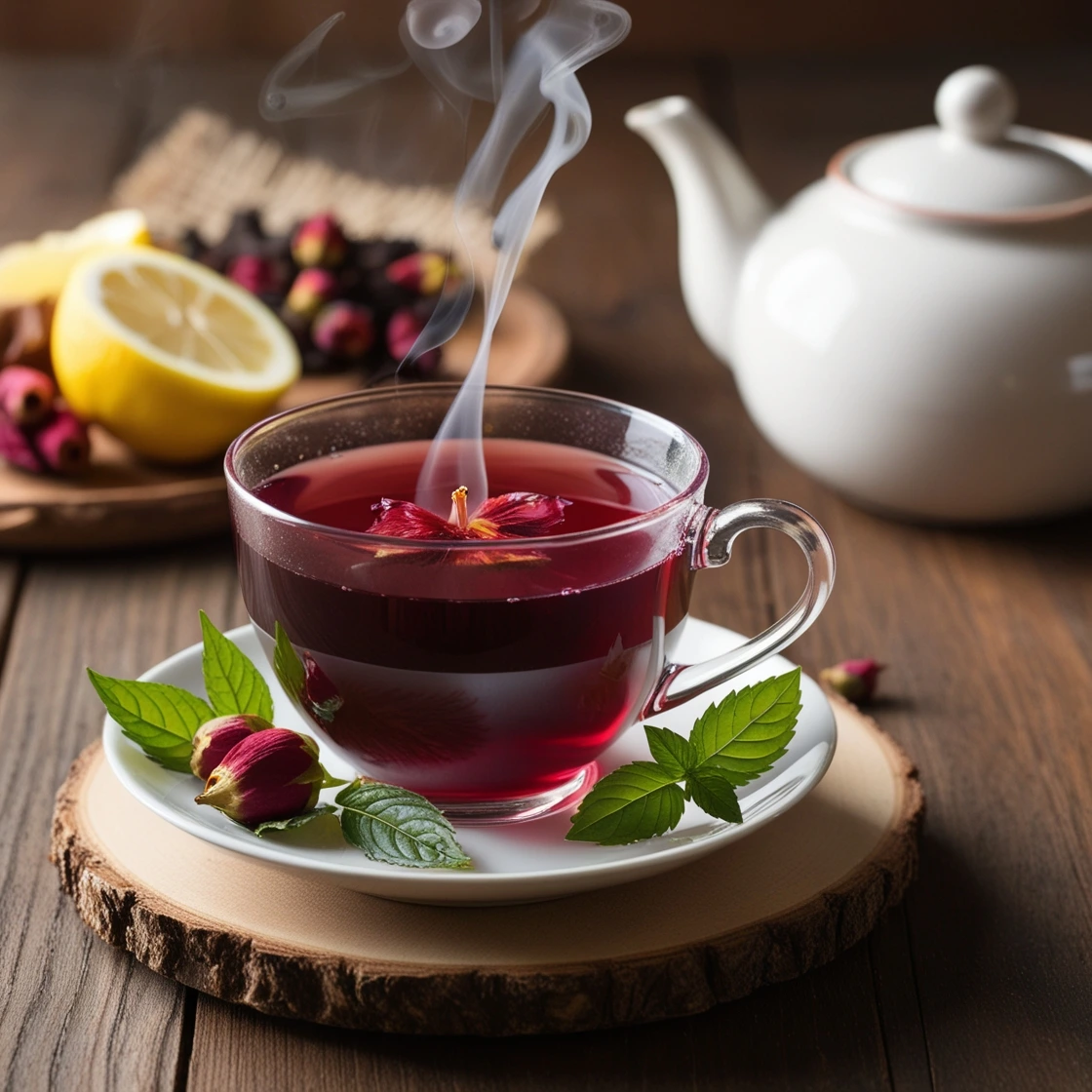Introduction
The flu season is in full swing in USA and you are probably scurrying to boost your immunity to save yourself from the ordeal. But are you looking for natural remedy to boost your immune system without the side effects of over-the-counter medicines during the flu season and sniffle season? Well, elderberry syrup with echinacea recipe can be your go to solution. Rich in antioxidant properties and immune-boosting benefits. This herbal remedy is perfect for improving your everyday wellness or fighting off infections.
However, during the flu season and sniffle season when cold and influenza are prevalent, it can be difficult to find natural remedies that actually work. It is also a challenge to find a gentle yet effective remedy that does not have the potential adverse side effects of over-the-counter medications.
If you are suffering from a sore throat, looking for a natural solution to boost your immune system or want to support your body with medicinal herbs, this homemade elderberry syrup recipe is the answer you’ve been searching for.
Whether you’re a busy parent, a health-conscious individual, or simply someone looking to incorporate more herbal medicine into your life, this elderberry syrup recipe with echinacea offers a simple yet effective solution.
Shelf-Stable Elderberry Syrup Recipe
This recipe is especially effective and beneficial for those who want to make a shelf-stable elderberry syrup recipe that can be used year-round, or for anyone curious about using elderberries for their medicinal benefits.
We have all gone through the suffering of colds or the flu, especially during the colder months. If you prefer natural remedies over over-the-counter medications, then elderberry syrup with echinacea and rosehips is your go to herbal remedy that is both gentle and effective.
Making this syrup at home not only gives you control over the ingredients but you get to handpick the most potent, fresh elderberries and other healthful properties to fight off infections.
Here we will provide you with a science-backed guide on how to prepare and preserve elderberry syrup using simple and easily available ingredients such as raw honey, cinnamon sticks, and fresh elderberries.
We will provide you with a comprehensive and lucid guide about the medicinal properties and health benefits of elderberry and how to store it for legendary shelf life.
Here you will get answers to frequently asked questions such as “Can I add echinacea to my elderberry syrup?” and “What is the best way to preserve elderberry syrup?”
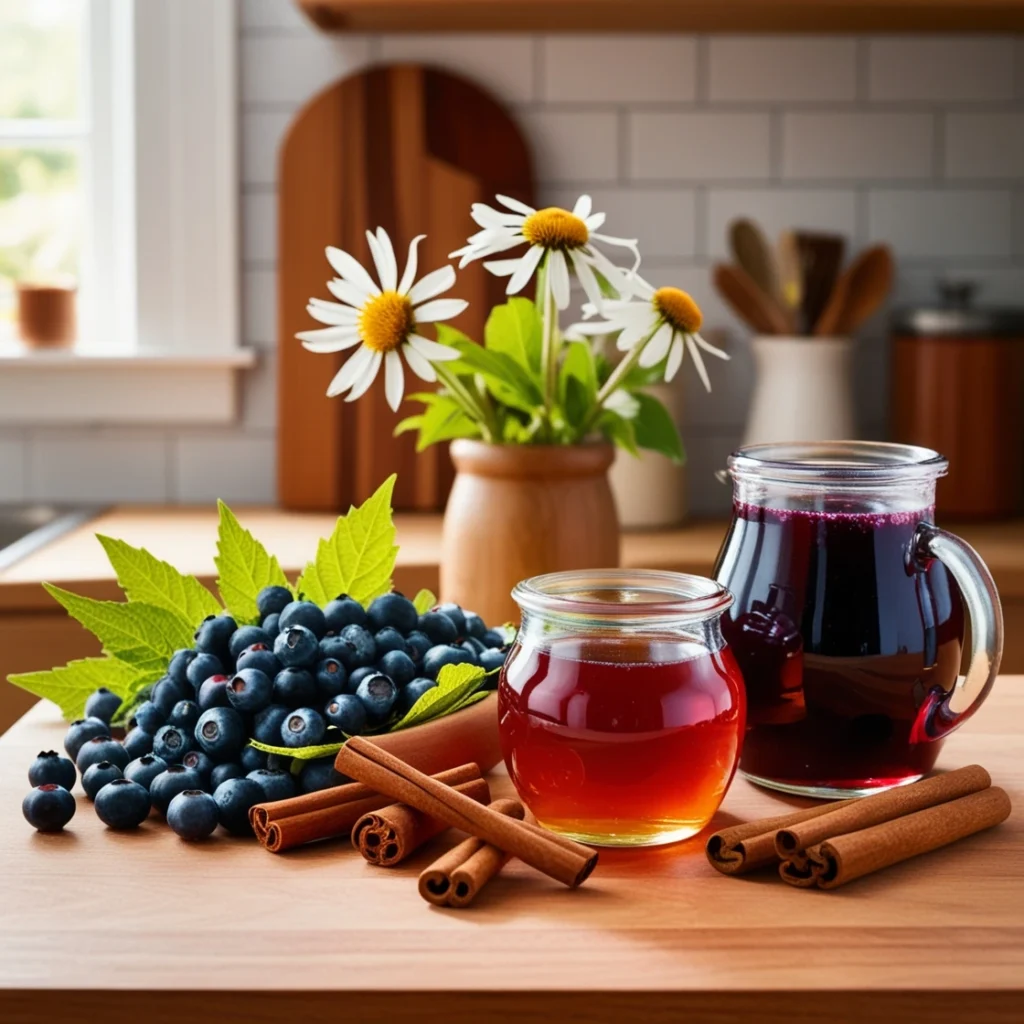
Ingredients for Elderberry Syrup Recipe with Echinacea
To prepare your nourishing elderberry syrup, you’ll need high-quality immune boosting medicinal herbs and some extra ingredients to enhance its flavor and healing properties. Here’s a list of essentials:
- A. Black elderberries or frozen elderberries (fresh or dried options)
- B. Raw honey or unpasteurized honey (avoid giving honey to children under one due to the risk of infantile botulism)
- C. Cinnamon Sticks and fresh ginger root for added antioxidant properties and warmth
- D. Echinacea Root, a key component for boosting the immune system
- E. Spring water or boiling water (you’ll need approximately 900ml of water)
- F. Optional: Lemon juice, fruit juice, or extra liquid for flavor, ginger, whole cloves, rose hips and lemon.
By using these natural remedies as ingredients for your elderberry syrup with echinacea, you can ensure that your syrup is not only tasty but also packed with powerful antioxidants and medicinal benefits.
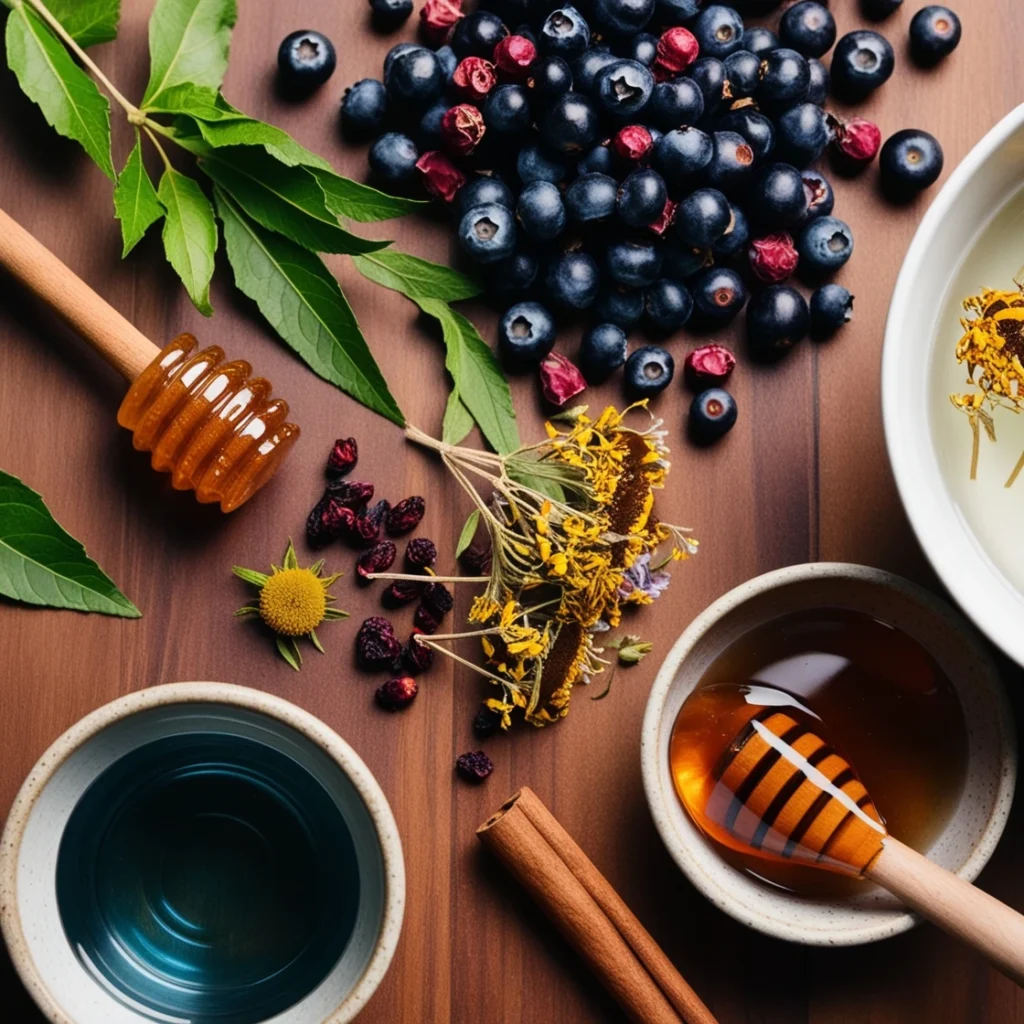
Where Can You Get Elderberries
Now that you have the list of ingredients, the next question for you is where to get elderberries. You can use both black or blue elderberry varieties to make elderberry syrup with echinacea.
So how will you get them? Well, foraging is one option for you especially if the berries are in season. It is usually during August-September, depending on where you live.
You can also grow elderberries in your backyard
If you are unable to get fresh elderberries, you can always use dried elderberries. However, during flu season and sniffle season they do often go out of stock.
What Type of Honey to Use
Raw hone is the best option for you while making elderberry syrup with echinacea. Its even better if its local to your region as it can retain its immune boosting components such as powerful antioxidants, nutrients, and enzymes because it has never been heated.
You can buy local raw honey at natural food stores and farmer’s markets. You can also get it from a local beekeeper.
Step-by-Step Elderberry Syrup Recipe with Echinacea
Preparation
- A. You can start by combining the raw elderberries, Cinnamon Sticks, and fresh ginger in a pot.
- B. Pour in cups of water (about 4–5 cups) and bring the elderberry mixture to a boil over medium heat.
- C. Let it simmer for 30-45 minutes, allowing the amounts of liquid evaporate slightly while releasing the herbal properties of the ingredients.
- D. Strain the mixture through a fine-mesh strainer or mesh tea strainer, ensuring no solids remain.
- E. If you’re using extra ingredients, like lemon juice, add them to the strained syrup.
- F. Allow the liquid cool to a safe temperature before stirring in the cup honey.
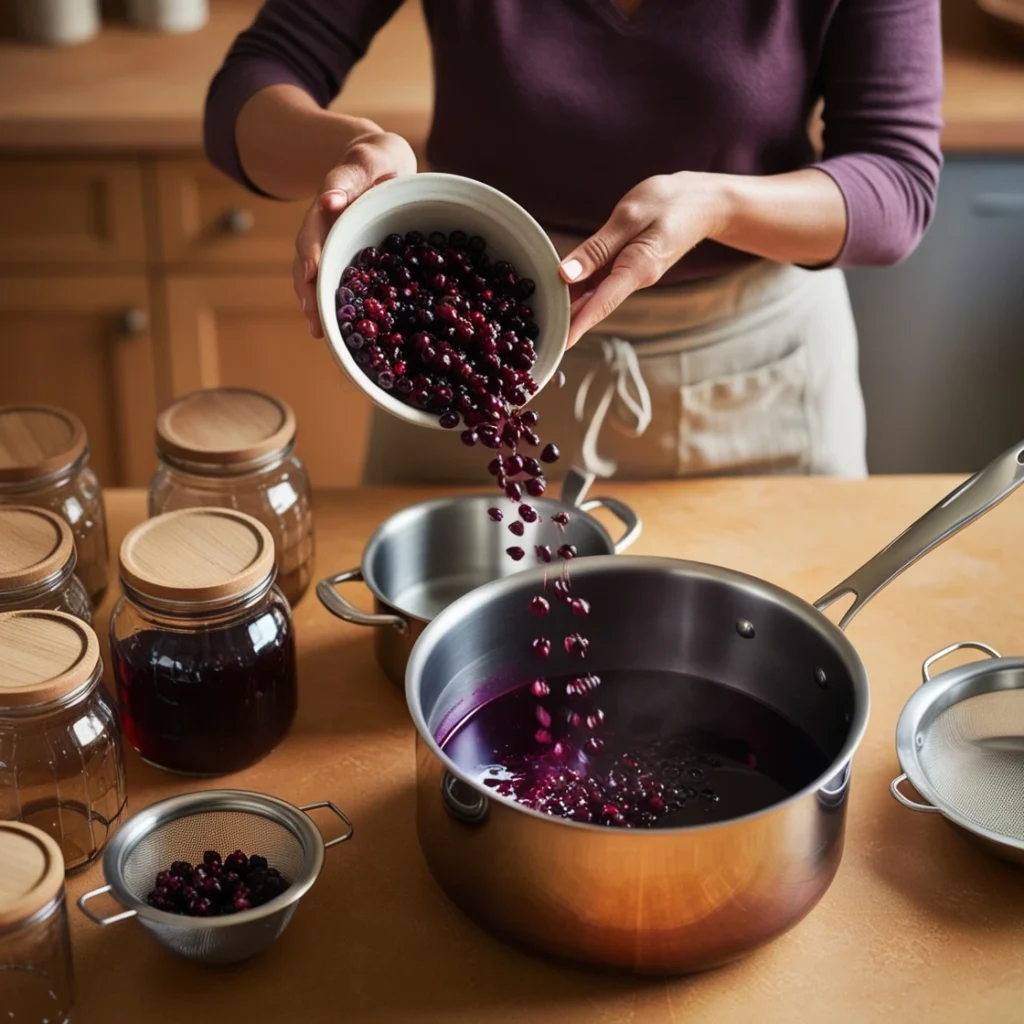
Optional Additions
But there is one problem. Elderberry not exactly sweet but has a rather tart flavour. You can make enhance elderberry syrup recipe with unique ingredients or flavors can make it even more enjoyable. Here are some ideas to take your syrup to the next level:
Fruit Juices and Sweeteners
You can sweeten elderberry syrup with echinacea by adding extra juice, such as apple, orange, or pomegranate juice, to complement the natural flavor of elderberries. This will not only improve the taste but also introduce additional antioxidant properties to the syrup. Alternatively, substitute or supplement raw honey with maple syrup or agave for a twist.
Spices for Warmth and Depth
You can also add spices like cloves, nutmeg, or cardamom to deepen the flavor profile of your syrup. These spices are known for their medicinal properties and add a warming quality, ideal for cold weather months.
Star Anise for a Unique Flavor
Adding star anise creates an exotic touch to your syrup. The subtle licorice-like flavor pairs beautifully with elderberries and brings an aromatic richness to the mix.
Another elderberry syrup with echinacea recipe
Here is another recipe for elderberry syrup with echinacea
- A. Ingredients: Elderberries, dried echinacea, cinnamon sticks, fresh ginger, water, and raw honey (like Manuka).
- B. Process: Boil all ingredients except honey, simmer for 45 minutes, mashing berries. Strain through a fine sieve or cloth.
- C. Final Touch: Cool slightly, then mix in honey.
- D. Storage: Keep refrigerated for 1-2 months or freeze in portions.
- E. Usage: Ideal for daily immune support during colder seasons.
Medicinal Benefits of Elderberries and Echinacea
There are several health benefits of elderberries including black elderberries and fresh elderberries. They are rich in with vitamins A and C, as well as flavonoids, which contribute to their powerful antiviral properties.
These nutrients boost the immune systems and provide protection against colds and flu. The berries are also packed with dietary fiber, promoting digestive health.
Elderberries also have anti-inflammatory qualities that may help reduce swelling in the sinuses during respiratory infections. Their role as an immune system booster makes them indispensable for sniffle season.
Research shows that consuming elderberries can prevent or delay the onset of diseases. “Elderberry is highly reputed for its health-improving effects. Multiple pieces of evidence indicate that the consumption of berries is linked to enhancing human health and preventing or delaying the onset of chronic medical conditions,” states a research paper published in a peer reviewed journal.

Echinacea Root’s Healing Properties
Echinacea Root is widely used for its ability to stimulate the immune system. It has been a staple in herbal medicine for ages. Research shows that its effective in reducing the duration and severity of colds, thanks to its diaphoretic property, which helps clear toxins through sweat.
By making echinacea an ingredient in your elderberry syrup with echinacea recipe you can not only benefit from its immune boosting effect but also from its adds herbal properties that promote faster recovery during illnesses. For those seeking resilience during times of stress or sickness, this herb is an excellent plant ally.
“The plant is used in chemoprevention and chemotherapy for infectious disorders of the upper and lower respiratory tracts. Toothaches, gut pain, snake bites, skin problems, epilepsy, chronic arthritis, and cancer have all been treated with this species in the past. For instance, research has demonstrated the plant’s ability to cause anti-anxiety, anti-depression, cytotoxicity, and anti-mutagenic effects,” states a research paper.
Preserving Elderberry Syrup for Long-Term Use
Here are some DIY ways for preserving elderberry syrup for long-term use:
Canning Elderberry Syrup
Canning is the best method for creating a shelf-stable elderberry syrup recipe. This process involves sealing the syrup in clean glass bottles or jars, ensuring an airtight environment that prevents contamination. Start by sterilizing the containers using boiling water. Once the syrup is poured into the jars, seal them tightly and place them in a water bath canner for 10–15 minutes.
This technique not only enhances the syrup’s shelf life but also preserves its healthful properties for up to a year. Properly canned syrup is perfect for maintaining your wellness arsenal during extended cold weather months.
Freezing and Refrigeration
Freezing is a quick and efficient way to store elderberry syrup, especially for recipes like elderberry syrup recipe with fresh elderberries. Pour the cooled syrup into silicone ice cube trays for easy portioning. Once frozen, transfer the cubes to a freezer-safe bag or container. This method ensures that the syrup remains potent and fresh for up to 6 months.
Refrigeration is suitable for shorter periods, typically lasting 2–3 months. Use glass bottles or jars to store your syrup, as they are non-reactive and help preserve the flavor. Keep the syrup in the coldest part of your refrigerator to extend its shelf life.
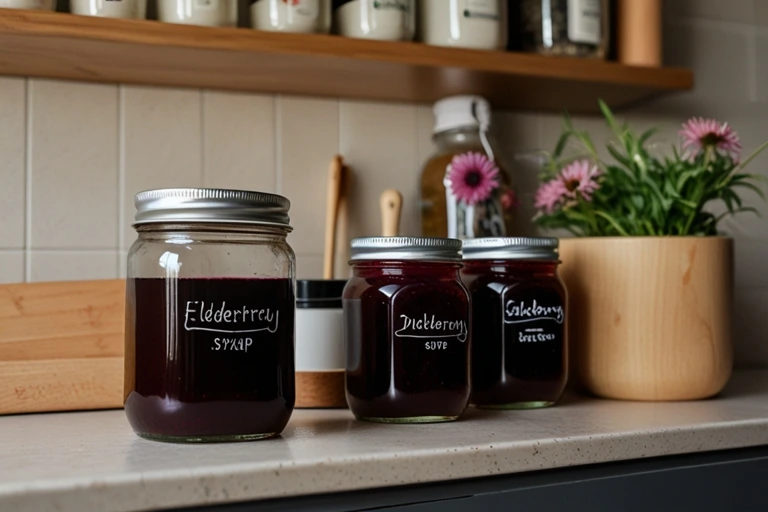
Variations of Elderberry Syrup Recipes
1. Elderberry Syrup with Fresh Ginger Root
Adding fresh ginger root to your recipe not only enhances the flavor but also introduces additional medicinal benefits. Ginger is widely recognized for its anti-inflammatory and antimicrobial properties, making it a valuable addition during flu seasons. The warming effect of ginger also soothes the throat and promotes overall comfort.
To incorporate ginger, peel and slice a 1-inch piece of fresh ginger and simmer it with the cups of elderberry decoction. This combination creates a powerful blend that’s both tasty and effective.
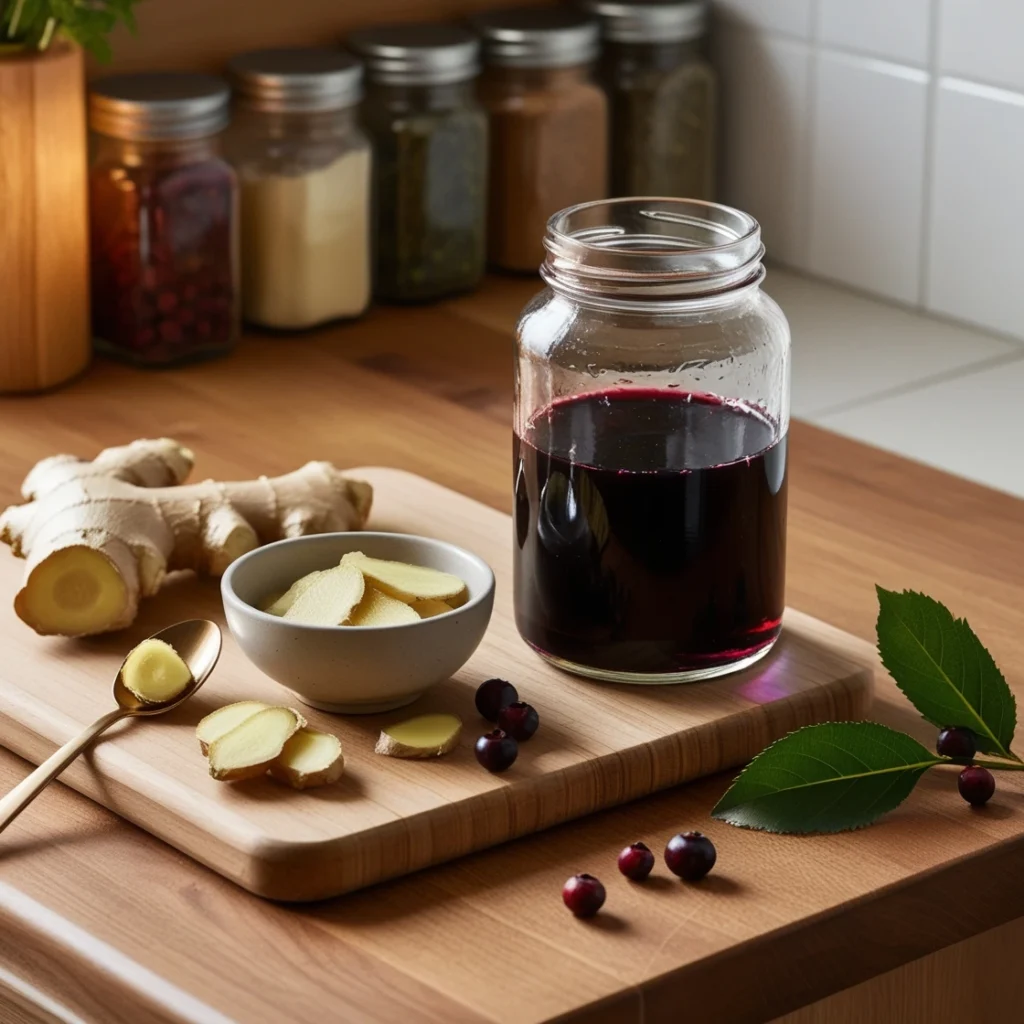
2. Elderberry Syrup Recipe with Echinacea and Rosehips
Rosehips are a rich source of vitamin C, which works synergistically with elderberries to boost the immune system. Their tart and tangy flavor complements the natural sweetness of raw honey, creating a well-balanced syrup.
When preparing an elderberry syrup recipe with rosehips and echinacea, steep 1–2 teaspoons of dried rosehips with the elderberries and Echinacea Root. Strain the mixture using a mesh tea strainer to ensure a smooth consistency.
Conclusion
Elderberry syrup with echinacea is an effective herbal remedy that boosts your immune system, especially during the flu season or sniffle season. The combination of elderberry syrup with echinacea and other ingredients such as raw honey, cinnamon sticks, and fresh elderberries offers a powerhouse of antioxidant properties, immune-boosting benefits, and medicinal herbs that can help fight off colds and flu.
Whether you’re using elderberry syrup recipe with echinacea and rosehips or opting for the elderberry syrup recipe with star anise, the versatility and healthful properties of this syrup make it a must-have in your home remedy toolkit.
By incorporating fresh ginger root, lemon juice, and raw elderberries, you enhance the medicinal properties of the syrup, offering a soothing solution for a sore throat or the early signs of a cold.
For those who prefer a shelf-stable elderberry syrup recipe, canning or freezing the syrup ensures that you have an immune booster readily available during cold weather months. When stored in clean glass bottles, the syrup can last for up to 2-3 months, making it a great option for long-term use.
If you’re wondering how to use this natural elderberry syrup for your daily health regimen, consider taking 1-2 tablespoons per day for general wellness, or a larger dose when you’re fighting off a cold or flu.
As always, be mindful of potential interactions and consult a health professional if you have concerns about mixing herbs or taking elderberry syrup with other vitamins.
Start creating your own homemade elderberry syrup today and harness the power of these beneficial berries to enhance your health. With the right ingredients and a recipe card, you can easily prepare this potent elderberry syrup for your family.
Why wait for the next flu season? Get started now and make sure you’re prepared with this powerful herbal remedy to help maintain your resilience during times of illness. So what is your opinion of this elderberry syrup with echinacea recipe ? Tell us in the comments section.

FAQ: Elderberry Syrup With Echinacea Recipe
1. What are the health benefits of elderberry syrup?
- A. Elderberry syrup is packed with antioxidants, making it great for overall health.
- B. Contains black elderberries, which are known for their immune-boosting properties.
- C. Helps fight off colds, flu, and respiratory systems due to its antiviral properties.
- D. Soothes a sore throat thanks to the addition of raw honey, which has its own medicinal properties.
- E. Regular consumption can reduce inflammation and provide immune system booster effects.
- F. A great remedy for cold weather months and during flu seasons.
2. How do I make elderberry syrup at home?
- Ingredients needed:
- A. 1 cup of fresh elderberries (or ½ cup frozen elderberries)
- B. 4 cups water
- C. 1–2 teaspoons Echinacea Root
- D. 1–2 cinnamon sticks
- E. 1 cup raw honey (or unpasteurized honey)
- F. 1 tablespoon lemon juice
- Instructions:
- A. Combine elderberries, Echinacea Root, and cinnamon sticks in a saucepan.
- B. Add cups of water and bring to a boil.
- C. Reduce heat, simmer for 30–45 minutes.
- D. Strain through a fine-mesh strainer to remove the berries and herbs.
- E. Stir in raw honey and lemon juice.
3. Is elderberry syrup safe for children?
- A. Elderberry syrup is safe for children over the age of one.
- B. Recommended daily dose for children is 1–2 teaspoons.
- C. Honey should not be given to children under one year old due to the risk of infantile botulism.
- D. Start with a smaller amount and gradually increase the dose to monitor for any side effects, like diarrhea from elderberry syrup.
- E. Always consult a health professional before giving syrup to children.
4. How long does elderberry syrup last?
- A. Shelf life of homemade elderberry syrup is typically 2–3 months when stored in a clean glass bottle.
- B. If you prefer a longer shelf life, you can can your syrup using sterilized jars, allowing it to last up to a year.
- C. Freezing elderberry syrup is another option: pour syrup into ice cube trays and store in a freezer bag.
- D. This allows you to use it throughout the year, especially during cold weather months.
5. Can elderberry syrup help with colds and flu?
- A. Elderberry syrup is a well-known herbal remedy for colds and flu.
- B. Its antiviral properties make it an effective treatment for respiratory infections.
- C. Reduces the severity and duration of flu symptoms, especially when taken at the onset of illness.
- D. The raw honey in the syrup also helps soothe a sore throat and suppress coughs.
- E. Works best during flu seasons or sniffle season when cold and flu viruses are prevalent.
6. How do I store elderberry syrup?
- A. Elderberry syrup should be stored in clean glass bottles and kept in a cool, dark place.
- B. For longer storage, you can your syrup using a water bath canning method. This helps preserve the syrup for up to a year.
- C. Alternatively, freeze your syrup in ice cube trays and store it in a freezer bag. This extends the shelf life and ensures you have syrup ready during the cold weather months.
- E. Frozen elderberries or syrup cubes are great for smoothies or hot drinks.
7. Can I use frozen elderberries to make elderberry syrup?
- A. Yes, frozen elderberries retain most of their antioxidant properties and are just as effective as fresh berries.
- B. Use them in your elderberry syrup recipe without thawing or thaw first for ease of use.
- C. Frozen berries are perfect for making syrup during the off-season when fresh berries aren’t available.
- D. To maintain potency, use frozen elderberries within a year of freezing.
8. Can I add other herbs to my elderberry syrup?
- A. Yes, adding other medicinal herbs like fresh ginger root or Echinacea enhances the immune-boosting properties of your syrup.
- B. Ginger root adds additional antioxidant properties and helps reduce inflammation.
- D. Cinnamon sticks can be added for flavor and further health benefits.
- E. Lemon juice can also be used for an extra vitamin C boost.
- F. Customize your elderberry syrup recipe with a variety of herbs to meet your specific health needs.

